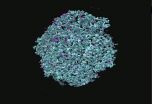They have a pill for that: How are weight loss drugs fueling the obesity epidemic?
2014-11-11
(Press-News.org) Consumers place great faith in weight loss pills and remedies, buying and using them more than ever before. American obesity rates, however, are skyrocketing. According to a new study in the Journal of Public Policy & Marketing, false beliefs about these drugs are causing Americans to gain more weight.
"Weight management remedies that promise to reduce the risks of being overweight may undermine consumer motivation to engage in health-supportive behaviors," write authors Lisa E. Bolton (Pennsylvania State University), Amit Bhattacharjee (Dartmouth College) and Americus Reed, II (University of Pennsylvania). "Put simply, why put effort into living a healthy lifestyle when a weight management remedy can take care of the problem?"
Study participants were each given free access to a bowl of chocolate cookies, with one group advised ahead of time about a new, powerful, fat-fighting pill. The group that believed in the existence of the new pill ate significantly more cookies per person--some participants consuming as many as 30. An additional test showed that the more fattening the cookie, the more the participants would overeat, as long as they expected to be able to take the weight loss pill.
The study warned that the very people who need to reduce weight the most and are desperately reaching for weight loss pills are unfortunately the ones most likely to then dangerously increase their consumption of unhealthy foods.
The good news was that encouraging consumers to look beyond the marketing and find real information about a drug was very effective in reducing their false expectations and unhealthy behavior. This same strategy could prove effective in other areas of consumer life, bringing relief, for example, to those who are trying to improve their finances but are falling prey to "quick fix" financial remedies.
"Given the ubiquity of remedies in today's marketplace, more research is needed to understand the impact of remedy marketing on consumers. There is ample room for policy makers and responsible marketers to improve remedy marketing practices to minimize potentially harmful consequences for consumers," the authors conclude.
INFORMATION:
Lisa E. Bolton, Amit Bhattacharjee, and Americus Reed, II. "The Perils of Marketing Weight Management Remedies and the Role of Health Literacy." Forthcoming in the Journal of Public Policy & Marketing. For more information, contact Lisa E. Bolton (boltonle@psu.edu).
https://www.dropbox.com/s/9lxfovk1zsqlna1/1-Bolton-weight%20management.docx?dl=0 END
ELSE PRESS RELEASES FROM THIS DATE:
2014-11-11
Why do some chemical farmers resist a profitable conversion to organic methods? A new study in the Journal of Marketing suggests it may be because making that change feels like switching belief systems.
"The ideological map of American agriculture reveals an unfolding drama between chemical and organic farming," write authors Melea Press (University of Bath), Eric Arnould (Southern Denmark University), Jeff Murray (University of Arkansas) and Katherine Strand (McGill University). "Chemical farmers argue that to make money, one must follow chemical traditions; when organic ...
2014-11-11
As obesity rates rise, health professionals and policy makers scramble to help consumers resist unhealthy eating choices, often focusing on better labeling and improved nutritional knowledge. According to a new study in the Journal of Marketing Research, however, training people to pay attention to their emotions is a far more powerful strategy.
"Consumers are often mindless," write authors Blair Kidwell (Ohio State University), Jonathan Hasford (Florida International University) and David M. Hardesty (University of Kentucky). "We not only demonstrate that emotional ...
2014-11-11
The American obesity epidemic is out of control, and health advocates are working hard to ensure that food labels clearly list calorie content and all unhealthy ingredients. But according to a new study in the Journal of Marketing Research, labeling alone contributes little to healthier eating decisions unless the item also costs more.
"Obesity rates have more than doubled in the past two decades, and large-scale interventions are necessary to dissuade people from consuming unhealthy food," write authors Avni M. Shah (Duke University), James R. Bettman (Duke University), ...
2014-11-11
Cities around the world are pouring money into beautiful bicycle paths in hopes of convincing citizens to drive less and bike more. According to a new study in the Journal of Public Policy & Marketing, however, getting people to go from four to two wheels isn't quite that simple.
"Although bicycling is a widely accepted way to travel around cities in Germany, Denmark, and the Netherlands," write authors Marius C. Claudy (University College, Dublin) and Mark Peterson (University of Wyoming), "it is still the most underutilized form of transportation in countries such as ...
2014-11-11
Reserve's borders have erroneously moved 50 kilometers
New species, named after the Luama Katanga Reserve, is now threatened by cattle ranches and forest destruction
NEW YORK (November 11, 2014) - WCS scientists in the Democratic Republic of Congo (DRC) have discovered a new species of plant living in a remote rift valley escarpment that's supposed to be inside of a protected area. But an administrative mapping error puts the reserve's borders some 50 kilometers west of the actual location. Now the new species, along with 900 other plant varieties and 1,400 chimpanzees, ...
2014-11-11
For their study, the researchers were able to fall back on uninterrupted long-term temperature measurements of groundwater flows around the cities of Cologne and Karlsruhe, where the operators of the local waterworks have been measuring the temperature of the groundwater, which is largely uninfluenced by humans, for forty years. This is unique and a rare commodity for the researchers. "For us, the data was a godsend," stresses Peter Bayer, a senior assistant at ETH Zurich's Geological Institute. Even with some intensive research, they would not have been able to find a ...
2014-11-11
Many businesses now offer customers the opportunity to make charitable donations to good causes along with their purchases, but does this really encourage the customer to buy more? According to a new study in the Journal of Marketing, the answer is a firm "Yes."
"The mere presence of a charitable donation opportunity can generate significantly more sales," write authors Michelle Andrews (Temple University), Xueming Luo (Temple University), Zheng Fang (Sichuan University) and Jaakko Aspara (Hanken Swedish School of Economics). "Offering the donation nearly doubled the ...
2014-11-11
When consumers see a company performing good deeds, they often assume that the company's products are healthy. According to a new study in the Journal of Public Policy & Marketing this may be far from true, and the company's socially responsible behavior may be creating a "health halo" over unhealthy foods.
"Research demonstrates that consumers frequently engage in inference making when evaluating food products. These inferences can be highly inaccurate, leading to unintended, unhealthy consumer choices," write authors John Peloza (University of Kentucky), Christine Ye ...
2014-11-11
A novel method of altering a protein in milk to bind with an antiretroviral drug promises to greatly improve treatment for infants and young children suffering from HIV/AIDS, according to a researcher in Penn State's College of Agricultural Sciences.
That's critical because an estimated 3.4 million children are living with HIV/AIDS, the World Health Organization reports, and nine out of 10 of them live in resource-limited countries in sub-Saharan Africa, where effective antiretroviral treatments still are not widely accessible or available. International medical experts ...
2014-11-11
Enterotoxigenic Escherichia coli (ETEC) bacteria are responsible each year for around 400 million cases of diarrhoea and 400,000 deaths in the world's low- and middle-income countries. Children under the age of five are most affected.
ETEC bacteria also cause diarrhoea in nearly one in two travellers to these areas.
Major breakthrough
Researchers at the University of Gothenburg's Sahlgrenska Academy are world leaders in research into ETEC and have now made a major breakthrough in collaboration with colleagues from the Wellcome Trust Sanger Institute in the UK, Karolinska ...
LAST 30 PRESS RELEASES:
[Press-News.org] They have a pill for that: How are weight loss drugs fueling the obesity epidemic?


